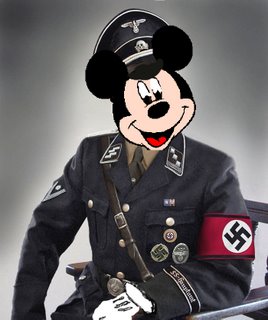
I love to rewrite history
A Show That Trumpeted History but Led to Confusion
By EDWARD WYATT
Published: September 18, 2006
It’s little wonder that ABC’s mini-series “The Path to 9/11” drew stinging criticism earlier this month for its invented scenes, fabricated dialogue and unsubstantiated accounts of how the Clinton and Bush administrations conducted themselves in the years encompassing the World Trade Center attacks of 1993 and 2001.
A more puzzling question is why ABC spent $30 million on what, since it lacked commercials, amounted to a five-hour public service announcement.
While the two-night docudrama was shown without a sponsor, ABC did not always intend it to be so. As recently as July, ABC was discussing the possibility of running the program with limited commercials from one or two major sponsors.
The network also saw a potential market in schools. It hired Scholastic Inc., the educational publisher, to create a study guide for high school teachers to go along with the mini-series, a move that implied the network saw a future in DVD sales of the mini-series to schools.
In the end, however, Scholastic scrapped its original study guide and no sponsors stepped up to help ABC defray the cost of the program. While the network did sell foreign rights to the show in a few markets, including Britain, Australia and New Zealand, it was left to shoulder nearly all of the cost by itself.
Once it became clear that it would have to go without sponsors, ABC began to promote the mini-series as a public service. That decision left the network open to a weighty question: Is it truly a public service if it alienates a significant part of the audience?
The mini-series drew respectable ratings, coming in second to a football game on NBC on its first night and winning the night on Sept. 11, its second night. But despite drawing an estimated 12 million to 13 million viewers each night, ABC was unable to capitalize on its large audience.
Typically, big productions like “The Path to 9/11” serve as vehicles for networks to promote their new fall lineup. But by excluding not only commercials but also promotional spots during the broadcast, ABC essentially gave away five hours of network time.
ABC has repeatedly declined to make its top executives available for interviews in the last two weeks. Asked specifically last week about the business decisions that went into the mini-series, ABC offered a statement on Friday.
“Throughout the history of the broadcast business, programming decisions have been made based not only on their commercial nature, but also on their relevance and potential public interest,” the statement said. “In greenlighting ‘The Path to 9/11,’ our commercial expectations very much took into account the nature of the movie. We proceeded with the project because of our belief in the importance of the subject.”
In couching its mini-series as a public service, however, ABC took on a burden that a drama, by its nature, is ill equipped to shoulder, according to one critic.
“Saying it is a public service is the same as claiming ideological ownership,” said Robert J. Thompson, director of the Center for the Study of Popular Television at Syracuse University. “If it is being packaged as a way to expose people to the contents of the 9/11 Commission report, and you’re encouraging it to be used in schools, then you do have to present it as factual. It doesn’t do a good job of that.”
After former Clinton administration officials began to complain that the invented scenes and made-up dialogue presented an inaccurate picture and showed them as being less than vigilant in their pursuit of Osama bin Laden, the network added a disclaimer, saying that “for dramatic and narrative purposes, the movie contains fictionalized scenes, composite and representative characters and dialogue, as well as time compression.”
No comments:
Post a Comment